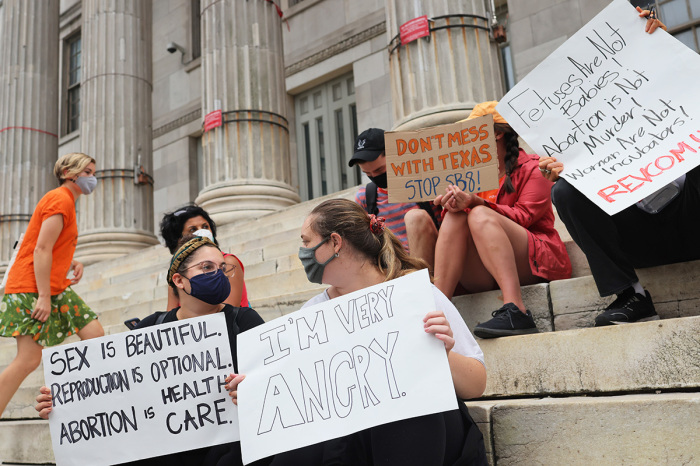Media upset over corporate silence on Texas abortion law

“Corporate America declines to comment on Texas abortion ban,” sighs the Financial Times.
“Corporate America’s Response to Texas Abortion Law? Silence,” bemoans The Daily Beast.
“Where is the business backlash on Texas’s abortion law?” demands Fortune.
You can almost feel the exasperation through your screen, the palpable outrage. “How dare these corporations be so disloyal?!” Over the Texas abortion law, “woke capital” has not quite reared its ugly head – more like a slight nod. So far, activist corporations have exercised uncharacteristic restraint, only able to muster toothless complaints where there was once the threat of mass boycotts. Since Governor Abbot signed the law, this is all the punishment woke capital has conjured:
- The web hosting company GoDaddy dropped support for a site that allowed citizens to post tips about possible violations of the law.
- Ride-sharing companies Lyft and Uber announced they would cover legal fees for their drivers who may be sued under the new law.
- Lyft said they would donate $1 million to Planned Parenthood.
- Dating sites Bumble and Match said they would launch a “relief fund.”
That’s how CNN summarized the corporate response to the law, which bans most abortions after 6 weeks. Because our culture has the attention span of a particularly scatterbrained goldfish, it may not be immediately obvious just how muted the corporate backlash has been by historical standards. Past attempts by state legislatures to put any limitation whatsoever on abortion were quickly followed with denouncements and the threat of boycotts by corporate management.
After Alabama passed its abortion restrictions in 2019, nearly 200 CEOs took out a full-page ad in the New York Times, perversely arguing that abortion restrictions are bad for “health” and “business,” under the headline “Don’t Ban Equality.” (Odd choice of word – last time I checked, it was generally illegal to dismember adults.) When Georgia passed a heartbeat bill, Disney, Netflix, and WarnerMedia not-so-subtly implied they would boycott the state, which had become a highly coveted filming destination.
In the realm of corporate politics, shareholder activist groups have spent the last few years passing resolutions that are thinly veiled attempts at getting corporations to commit to the proposition that abortion is good for business. This is generally done by commissioning reports on the “risks” of attempts to restrict “reproductive healthcare,” or whatever euphemism for baby killing is in vogue.
Yet the corporate world has been surprisingly silent over what is arguably the most significant piece of pro-life legislation in decades. While conservative Christians have struggled with the dawning awareness that cultural libertinism need not be at odds with corporate power, the media has (mostly correctly) assumed that big business would stand on their side of the culture war. Naturally, they are confused at the relatively feeble response to Texas’ abortion bill from the private sector. In the past, corporations were all too enthusiastic; today, they are apathetic. What changed?
Over the latter years of the Trump administration and into the Biden presidency, there has been a massive shift in conservative attitudes towards “woke capital.” The pro-business and libertarian factions of the party have fallen into disrepute, and virtually every prospective future leader of the party (not to mention Trump himself) has at least signaled an anti-business bent. The Calvin Coolidge branch is routing in the face of the Roosevelt branch’s cavalry charge.
Outside of politics, Christian corporate engagement has suddenly become a reality. Christian investors are beginning to take their rights as shareholders seriously. I have seen some of this first-hand, attending annual meetings and talking to Investor Relations representatives, through our analysis firm Bowyer Research. Christian investors are far more interested in corporate engagement than they once were.
For a long time, almost all shareholder action was done by secular left-wing activist groups. Now Christian conservative shareholders are becoming aware that they have the same rights as the other side and are actively engaging with corporations in a way they never have before. When we asked questions at shareholder meetings, corporate management was often on the defensive, and on some occasions willing to engage with us.
For years, “woke capital” has maintained a highly successful, mostly uncontested, alliance with the secular left. Now they are facing a pincer movement: from the top, a Republican party that increasingly views big business as an enemy, not an ally; from the bottom, conservative Christian shareholders who are sick of seeing their assets used to promote ideologies they detest. Corporate management appears to be increasingly aware that they cannot spit on everything conservative Christians value and expect Republicans to keep cutting their taxes.
Even if NARAL or some other activist group manages to convincea group of CEOs to state that abortion is good for business, there is far more hesitation to take a side on this highly controversial issue than there once was. Abortion is perhaps the single issue that animates religious voters the most. For a business to come out in favor of it, in this climate, with a Republican party actively looking for an excuse to punish corporations, and shareholders who are increasingly willing to use their legal authority, would be a dangerous bet. A simple risk analysis is keeping corporate activism in check.
Naturally, the media is shocked about this development. Corporate America has been a reliable ally of secular progressives for years, so it’s no wonder that the media is in despair over their newfound reticence. Moloch’s PR team doesn’t often have to deal with hesitation. It’s time they got used to it.
Charles is a risk analyst and columnist at TownhallFinance. He has written for National Review Online, AsiaTimes, RealClearMarkets, and the Theopolis Institute. @charlesgbowyer




























